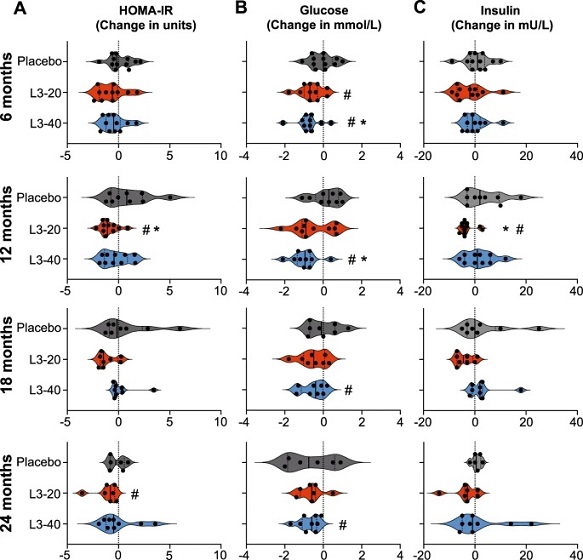Diabetes News: Induced Hookworm Infection Showed Improvements In Type 2 Diabetes Patients As Fasting Glucose And Insulin Resistance Were Lowered!
Thailand Medical News Team Aug 17, 2023 2 years, 6 months, 1 week, 1 day, 1 hour, 23 minutes ago
Diabetes News: In an era dominated by the escalating prevalence of metabolic disorders, innovative approaches are essential to tackle the growing burden of conditions like type 2 diabetes mellitus (T2D). The conventional wisdom surrounding T2D primarily revolves around lifestyle factors, such as sedentary behavior and poor dietary choices. However, recent scientific inquiry has taken an intriguing turn, focusing on the role of parasitic helminths, specifically hookworms, in revolutionizing metabolic health. A pioneering human trial at James Cook University-Australia has thrust the potential of hookworm infection into the spotlight, suggesting a promising avenue for managing T2D and related conditions.
 Effect of experimental hookworm infection on insulin resistance (HOMA-IR), fasting blood glucose and insulin.
Effect of experimental hookworm infection on insulin resistance (HOMA-IR), fasting blood glucose and insulin.
Changes in the (A) Homoeostatic model assessment of insulin resistance (HOMA-IR, units), B fasting blood glucose and (C) fasting blood insulin levels from baseline values at each 6-monthly evaluation visit. Violin plots display each individual data point, median and IQR. Dotted vertical line indicates baseline levels (0 change). *Significant difference to placebo, Kruskal–Wallis test with Dunn’s multiple comparisons. #Median value significant difference to baseline, Durbin, Skillings–Mack test and Wilcoxon signed-rank test.
The Metabolic Syndrome Puzzle
Metabolic syndrome, a precursor to T2D, encompasses a constellation of interrelated metabolic abnormalities, including insulin resistance, dyslipidemia, and obesity. This complex syndrome poses a significant challenge to global health due to its strong association with chronic diseases. While lifestyle factors remain central in its etiology, the absence of parasitic helminth infections in developed nations has piqued scientific curiosity. Recent evidence suggests that helminth infections might play a pivotal role in shaping immune responses, regulating inflammation, and influencing metabolic processes, potentially offering a novel approach to managing metabolic disorders.
A Bold Step - The World’s First Human Trial
At the helm of this groundbreaking research is Dr Doris Pierce, an esteemed researcher from James Cook University's Australian Institute of Tropical Health and Medicine (AITHM). Dr Pierce's two-year human trial marked an unprecedented exploration into the potential of live hookworm larvae as a means to enhance metabolic health.
Dr Pierce told
Diabetes News reporters at TMN, "Metabolic diseases are characterized by inflammatory immune responses and past research has suggested that hookworms release proteins into their host to control the immune system and safeguard their survival.”
The trial's cohort of 40 participants comprised individuals displaying early warning signs of impending metabolic diseases, including T2D. The study's overarching objectives were twofold: to assess the safety and tolerability of hookworm infection and to explore potential metabolic benefits derived from this unique
approach.
Participants were allocated into distinct groups, each receiving different dosages of hookworm larvae or a placebo. The trial's design aimed to meticulously evaluate both safety and efficacy. An underlying hypothesis postulated that helminths release proteins into their hosts, exerting control over immune responses and consequently influencing metabolic health. Dr Pierce's trial meticulously tracked participant health through regular clinical assessments, ensuring their safety throughout the study.
Promising Outcomes
The trial yielded promising results that offer a glimmer of hope for those at risk of T2D. Among participants infected with 20 hookworm larvae, a substantial reduction in insulin resistance was noted.
Notably, the Homeostatic Model Assessment of Insulin Resistance (HOMA-IR) levels plummeted from a pre-trial average of 3.0 units to a remarkable 1.8 units within just 12 months. This remarkable improvement heralded a restoration of insulin sensitivity to a normal, healthy range.
Beyond the numerical data, participants in this group reported an uplifted mood compared to their placebo counterparts, an observation that assumes even greater significance considering the backdrop of the challenging COVID-19 pandemic.
Safety and Future Prospects
Amidst the study's success, concerns over safety and long-term implications remained paramount. While some participants experienced anticipated gastrointestinal symptoms as the hookworms established themselves, the overall safety profile was reassuring. Intriguingly, almost all hookworm-infected participants chose to retain their worms after the trial's conclusion, indicative of their perceived benefit. Dr Paul Giacomin, an immunologist who contributed to the study, underscored the imperative of comprehending the precise mechanisms underlying hookworm-mediated metabolic improvements. Unraveling these mechanisms could potentially pave the way for innovative protein-based treatments that mimic the effects of live hookworms.
A Glimpse into Future Research
Although the trial's impact is undeniably significant, its sample size and duration did impose limitations. The need for longer-term investigations that delve into sustained effects, optimal dosages, and the intricate mechanisms driving these improvements is undeniable. Larger-scale studies that follow participants over extended periods can provide insights into the durability of the observed benefits and the interplay between hookworms and metabolic health. Furthermore, understanding the dynamic relationship between hookworm-mediated reductions in body mass and improvements in insulin resistance could unveil novel therapeutic avenues.
Conclusion
As the world grapples with the escalating burden of metabolic disorders, the James Cook University trial emerges as a beacon of hope. Through the lens of hookworm infection, a new chapter in T2D management unfolds - one that harnesses the symbiotic interactions between parasitic helminths and the human body's immune system.
The study findings were published in the peer reviewed journal: Nature Communications.
https://www.nature.com/articles/s41467-023-40263-4
For the latest
Diabetes News, keep on logging to Thailand Medical News.
Read Also:
https://www.thailandmedical.news/news/u-s-nih-study-finds-that-previous-hookworm-infections-could-prevent-covid-19-disease-severity
